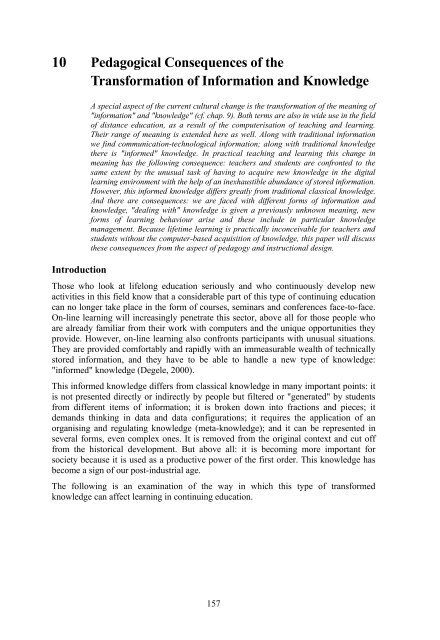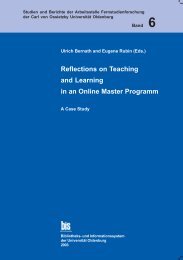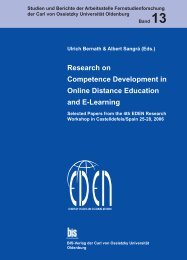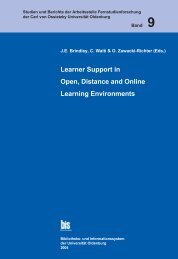Distance Education in Transition - Master of Distance Education ...
Distance Education in Transition - Master of Distance Education ...
Distance Education in Transition - Master of Distance Education ...
Create successful ePaper yourself
Turn your PDF publications into a flip-book with our unique Google optimized e-Paper software.
10 Pedagogical Consequences <strong>of</strong> the<br />
Transformation <strong>of</strong> Information and Knowledge<br />
Introduction<br />
A special aspect <strong>of</strong> the current cultural change is the transformation <strong>of</strong> the mean<strong>in</strong>g <strong>of</strong><br />
"<strong>in</strong>formation" and "knowledge" (cf. chap. 9). Both terms are also <strong>in</strong> wide use <strong>in</strong> the field<br />
<strong>of</strong> distance education, as a result <strong>of</strong> the computerisation <strong>of</strong> teach<strong>in</strong>g and learn<strong>in</strong>g.<br />
Their range <strong>of</strong> mean<strong>in</strong>g is extended here as well. Along with traditional <strong>in</strong>formation<br />
we f<strong>in</strong>d communication-technological <strong>in</strong>formation; along with traditional knowledge<br />
there is "<strong>in</strong>formed" knowledge. In practical teach<strong>in</strong>g and learn<strong>in</strong>g this change <strong>in</strong><br />
mean<strong>in</strong>g has the follow<strong>in</strong>g consequence: teachers and students are confronted to the<br />
same extent by the unusual task <strong>of</strong> hav<strong>in</strong>g to acquire new knowledge <strong>in</strong> the digital<br />
learn<strong>in</strong>g environment with the help <strong>of</strong> an <strong>in</strong>exhaustible abundance <strong>of</strong> stored <strong>in</strong>formation.<br />
However, this <strong>in</strong>formed knowledge differs greatly from traditional classical knowledge.<br />
And there are consequences: we are faced with different forms <strong>of</strong> <strong>in</strong>formation and<br />
knowledge, "deal<strong>in</strong>g with" knowledge is given a previously unknown mean<strong>in</strong>g, new<br />
forms <strong>of</strong> learn<strong>in</strong>g behaviour arise and these <strong>in</strong>clude <strong>in</strong> particular knowledge<br />
management. Because lifetime learn<strong>in</strong>g is practically <strong>in</strong>conceivable for teachers and<br />
students without the computer-based acquisition <strong>of</strong> knowledge, this paper will discuss<br />
these consequences from the aspect <strong>of</strong> pedagogy and <strong>in</strong>structional design.<br />
Those who look at lifelong education seriously and who cont<strong>in</strong>uously develop new<br />
activities <strong>in</strong> this field know that a considerable part <strong>of</strong> this type <strong>of</strong> cont<strong>in</strong>u<strong>in</strong>g education<br />
can no longer take place <strong>in</strong> the form <strong>of</strong> courses, sem<strong>in</strong>ars and conferences face-to-face.<br />
On-l<strong>in</strong>e learn<strong>in</strong>g will <strong>in</strong>creas<strong>in</strong>gly penetrate this sector, above all for those people who<br />
are already familiar from their work with computers and the unique opportunities they<br />
provide. However, on-l<strong>in</strong>e learn<strong>in</strong>g also confronts participants with unusual situations.<br />
They are provided comfortably and rapidly with an immeasurable wealth <strong>of</strong> technically<br />
stored <strong>in</strong>formation, and they have to be able to handle a new type <strong>of</strong> knowledge:<br />
"<strong>in</strong>formed" knowledge (Degele, 2000).<br />
This <strong>in</strong>formed knowledge differs from classical knowledge <strong>in</strong> many important po<strong>in</strong>ts: it<br />
is not presented directly or <strong>in</strong>directly by people but filtered or "generated" by students<br />
from different items <strong>of</strong> <strong>in</strong>formation; it is broken down <strong>in</strong>to fractions and pieces; it<br />
demands th<strong>in</strong>k<strong>in</strong>g <strong>in</strong> data and data configurations; it requires the application <strong>of</strong> an<br />
organis<strong>in</strong>g and regulat<strong>in</strong>g knowledge (meta-knowledge); and it can be represented <strong>in</strong><br />
several forms, even complex ones. It is removed from the orig<strong>in</strong>al context and cut <strong>of</strong>f<br />
from the historical development. But above all: it is becom<strong>in</strong>g more important for<br />
society because it is used as a productive power <strong>of</strong> the first order. This knowledge has<br />
become a sign <strong>of</strong> our post-<strong>in</strong>dustrial age.<br />
The follow<strong>in</strong>g is an exam<strong>in</strong>ation <strong>of</strong> the way <strong>in</strong> which this type <strong>of</strong> transformed<br />
knowledge can affect learn<strong>in</strong>g <strong>in</strong> cont<strong>in</strong>u<strong>in</strong>g education.<br />
157





